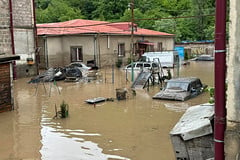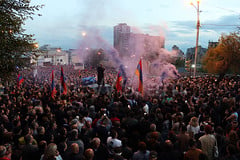
Armenian refugees from Nagorno-Karabakh are victims of ethnic cleansing. Whether Azerbaijan likes it or not, it is not possible to call it otherwise. Professor Pierre d'Argent, one of those representing Armenia's lawsuit, stated this while speaking Thursday at the International Court of Justice (ICJ) during its consideration of Armenia's case against Azerbaijan.
According to him, Azerbaijan's fairy tales about the voluntary departure of Armenians from Nagorno-Karabakh are simply ridiculous, and even Azerbaijani president Ilham Aliyev realizes this. Today we will probably hear again a tale where the executioner blames the victim for his suffering. Azerbaijan is doing everything to worsen the situation and ethnic cleansing in Nagorno-Karabakh. The day after the Azerbaijani military aggression in Nagorno-Karabakh, Aliyev said that Azerbaijan has restored its territorial integrity. At the same time, the Armenian population was leaving the region, and Aliyev soon announced the "great return" plan. This is a racist plan that involves replacing Armenians with Azerbaijanis, d'Argent said.
The professor reminded that during the collapse of the USSR, the overwhelming majority of the population of Nagorno-Karabakh were ethnic Armenians, whereas now there are only a few Armenians left there. He asked the ICJ members whether really believe that the destruction of Armenian symbols and the memory of the Armenian Genocide is a sign of bad taste, or are unique cases. The Baku regime categorically denies the fact of the Armenian Genocide, the recent incidents of the destruction of a cross and the shelling of a 13th century Armenian monastery Nagorno-Karabakh, the assurances of the Ministry of Culture of Azerbaijan that the Armenian Gandzasar Monastery is actually Caucasus Albanian are not mistakes by an intern; this is not accidental, and everything is perfectly calculated and implemented gradually by Azerbaijan, d'Argent said.
He quoted Aliyev, who had said that Azerbaijani flags are not raised in order not to scare Armenians, and asked whether this was a confession. And that, by the way, is not true; flags are raised in the occupied territory. In response to the decision of the ECtHR, the Azerbaijani authorities have changed the text of this decision, and they are simply misleading Strasbourg, as the flag of Azerbaijan now hangs on the most famous monument of Karabakh capital Stepanakert, d'Argent noted.
Azerbaijan perceives permissiveness as a green light to continue its policy; and if the ICJ makes an uncertain decision, Azerbaijan will definitely take advantage of this and complete its ethnic cleansing of Armenians, d'Argent stated.
The first reason why one cannot trust Azerbaijan is that words are not enough. Second, Baku's words and deeds are different. Azerbaijan did not say a word that it does not intend to settle Nagorno-Karabakh with Azerbaijanis, and now it has started the big migration program, d'Argent said.
In a letter dated October 2, the ICJ is informed that the Armenians who left Nagorno-Karabakh can return, and the rights of the few remaining Armenians are guaranteed. But this is not enough, and they know it very well in Azerbaijan, as the latter’s authorities require these Armenians to register, d'Argent noted, and asked what will happen to those who are not registered.
The authorities of Azerbaijan can announce that the Karabakh Armenians themselves renounced their property. Therefore, Armenia requires Azerbaijan to submit regular reports on the implementation of the ICJ decisions. But Azerbaijan has repeatedly bypassed these decisions, as it happened in the case of the installation of Azerbaijan checkpoints at the Lachin corridor, d'Argent said.
If the ICJ wants to guarantee the creation of conditions for the return of Armenians to Nagorno-Karabakh, respective measures must be taken; this is necessary to maintain the standing of the International Court of Justice, Pierre d'Argent stated.






















